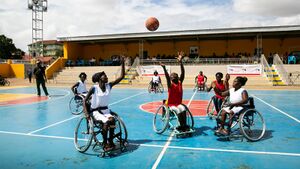Understanding the Rehabilitation Needs of Displaced Persons - Evaluation Report: Difference between revisions
No edit summary |
No edit summary |
||
| Line 24: | Line 24: | ||
Date: September 5 to October 30, 2022, with live online webinars on the 6th October 2022 (Webinar 1 Trauma Informed Care and Working with Survivors of Torture Webinar) and on the 12th October 2022 (Webinar 2 Pain Assessment and Management for Displaced Persons). Remains available on Plus platform to members. | Date: September 5 to October 30, 2022, with live online webinars on the 6th October 2022 (Webinar 1 Trauma Informed Care and Working with Survivors of Torture Webinar) and on the 12th October 2022 (Webinar 2 Pain Assessment and Management for Displaced Persons). Remains available on Plus platform to members. | ||
Requirements: Participants were required to complete online learning activities, participate in discussion forums, engage with additional resources, and complete course evaluations and quizzes. | Requirements: Participants were required to complete online learning activities, participate in discussion forums, engage with additional resources, and complete course evaluations and quizzes. | ||
== References == | |||
<references /> | |||
[[Category:Course Evaluation Reports]] | |||
Revision as of 17:11, 3 February 2023
Summary[edit | edit source]
From September 05 to October 30, 2022, Learning, Acting, and Building for Rehabilitation in Health Systems (ReLAB-HS), led by Physiopedia, successfully delivered a Massive Open Online Course (MOOC) entitled “Understanding the Rehabilitation Needs of Displaced Persons” via the Physiopedia Plus (Plus) online learning platform. The program consisted of seven independent courses, which included:
- Global Context for Displaced Persons
- Health and Well-Being for Displaced Persons
- Communication and Trauma-Informed Care for Displaced Persons
- Considerations for Working with Diverse Displaced Person Populations
- Considerations and Practical Tools for Working with Survivors of Sexual Violence and Trafficking
- Considerations for Working with Survivors of Torture
- Assessment and Management of Pain for Displaced Persons
In each course, the learner completed required learning activities and a final quiz that tested knowledge gained from the course. To complete the overall program, the learner had the option to submit and pass a written assignment. The program was also supported with two optional live online webinars to provide opportunity for increased learner interaction and engagement with the content experts. The webinar recordings were made available on the Plus platform for participants unable to access the webinars live. Trauma Informed Care and Working with Survivors of Torture Webinar with Eric Weerts, Rehabilitation Specialist Humanity and Inclusion and Sue Piché, Psychiatric and Mental Health Nurse Pain Assessment and Management for Displaced Persons Webinar with Zafer Altunbezel, Physiotherapist and Naomi O’Reilly, Physiotherapist Course Type: Free, Open, Online Institution: ReLAB-HS via Physiopedia About this Course: This MOOC aimed to equip health and social care professionals with a comprehensive knowledge of the rehabilitation needs for displaced persons, so they can play an effective and proactive role in local and global efforts to increase access to high-quality rehabilitation. Target Audience: These courses were designed and written for health and social care professionals, clinicians, students, assistants, and other rehabilitation-related health systems stakeholders. Time Commitment: 22 hours over eight weeks (with an optional extra eight hours) Date: September 5 to October 30, 2022, with live online webinars on the 6th October 2022 (Webinar 1 Trauma Informed Care and Working with Survivors of Torture Webinar) and on the 12th October 2022 (Webinar 2 Pain Assessment and Management for Displaced Persons). Remains available on Plus platform to members. Requirements: Participants were required to complete online learning activities, participate in discussion forums, engage with additional resources, and complete course evaluations and quizzes.








